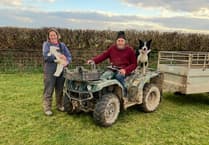DARTMOOR Commoners are to meet Agriculture Minister Joyce Quin in an attempt to persuade her to relax restrictions on grazing their animals.
They fear they may be squeezed out by Ministry rules which will reduce grazing and produce de-stocking.
'There are pockets of overgrazing, but the way the Ministry has assessed it is simplistic,' said council secretary Cherry Seage.
She said the commoners felt they were being pushed into joining the Environmentally Sensitive Areas project so they could get some compensation for de-stocking.
The commoners believe that restrictions are unnecessary at present and the situation will be to some extent rectified by the new Hill Farm Allowance to be introduced next year.
They fear that the current Ministry stocking rates would force a cut in the number of animals on the land of up to 80%. This could put some small farmers with no other land available out of business, it is claimed.
The result could be control of the moor by a few large ranchers, who might overgraze some areas and abandon others.
Around 500 farmers on 82 Dartmoor commons are affected by the regulations. Some commons, such as Okehampton, Chagford and Mary Tavy, have had stocking limits since last year.
The council's ecologist Peter Beale has written to Mike Highman, the Ministry's South-West Regional Services director, arguing for a relaxation of the rules and against drastic de-stocking.
He is cautioning the Ministry against reacting too quickly on the basis of an 'unproven' technique for assessing grazing by tests on heather.
He admitted that some commons were overgrazed, among them Bridestowe and Sourton and Peter Tavy, but said many others were not.
'The present policy could lead to undergrazing in a few years', he warned.
The council has enlisted the support of several MPs and has written to Secretary of State Nick Brown asking whether the DCC Act is still in force.
The commoners have long seen themselves as being self-regulating under the Act and are worried that it may be superseded by other legislation which will undermine their rights. The Ministry's reply was said to be 'unsatisfactory'.
The National Farmers' Union is also concerned about de-stocking, fearing that it may make farming on the moor unviable.
A Ministry statement in response to the complaints said that a professional assessment of grazing was carried out for it by the Farming and Rural Conservation Agency.
If overgrazing was found, the Ministry consulted with graziers to try to reach agreement on a plan to prevent further damage.
Sometimes, however, no agreement was reached and then statutory notices were issued on maximum stocking rates for the following year.
The penalty for not keeping to the limits was normally a cut in subsidy. There was no intention of keeping farmers from grazing the land, it said.
The Commoners had reached similar conclusions on overgrazing to those of the FRCA, it added.
'In these circumstances, we would be failing in our obligations if we did not take action when we have evidence that Dartmoor's environment is being significantly harmed.
The meeting between the commoners and the minister is being set up by MP John Burnett.
He said: 'The Ministry is making arbitrary decisions without liaising with the farmers.
'They are losing the rights of grazing which they have enjoyed for years. If they are driven off the moor, it may not be managed at all.'



